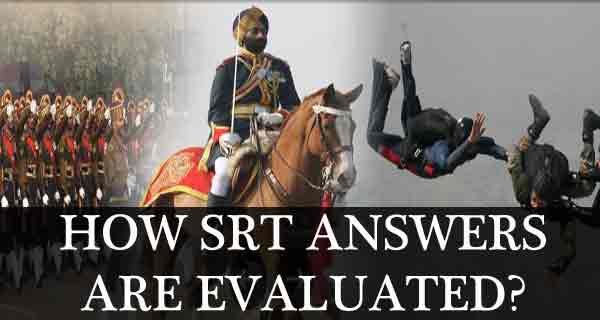Want to know how Situation Reaction Test answers of SSB interview is evaluated? There will be total 60 situations in SRT test. Read to know about evaluation process of SRT answers and prepare accordingly for upcoming SSB interview.

Situation Reaction Test or SRT is the third test in the series of Psychological testing. It is conducted on the second day of the SSB after screening.
You are given real-life situations and you are required to act on the situations, recording your responses in the answer booklet provided.
A total of 60 situations is given that are to be answered in 30 minutes. 30 seconds is given per situation to understand and act accordingly.
Situation Reaction Test is one of the best psychological techniques to test the candidates’ mental ability to react in a real-life situation by analysing the responses to the situations he gives. This is no problem until, you are under pressure. Being under pressure, you will tend to write the response that first comes to your mind naturally. This way, only the genuine you can be presented to the SSB.
SSB interview SRT evaluation process
Coming to the assessment of the Situation Reaction Tests, the assessors score the candidates’ responses based on the following categories as follows. This means, that the answers provided by the candidate are grouped into categories and is then assessed accordingly.
- Action Oriented Responses: These responses are the ones in which the candidate has initiated an action, executed it and completed it. These responses are considered to be the best responses for SRT evaluation as these responses shows that the candidate is self-confident and is able to execute and complete as task. These qualities are reflected by the candidates show that he is self-reliant and can handle a situation on his own.
- Incomplete Actions: In these categories of responses, the candidate is able to initiate an action and plan it, but leaves it incomplete in the middle. This can be due to reasons like – not being self-confident, unable to complete a task, not being determined enough to complete the task, etc. These leads to an impression that the candidate lack Officer Like Qualities which enable him to complete and execute a task.
- Unrealistic Responses: These are the most uncalled for responses in the SSB interview’s Situation Reaction Test. This shows that the candidate lack originality and lives in the world of fantasy. This often leads to candidates jumping to conclusions too early and without a proper reason.
- Leaving incomplete Responses: Since in SRT, the candidate is being pressurised with the time limit, he may not be able to complete the response and jump to the next situation. Although this does not explicitly show any lack of OLQ, but implicitly, it shows that the candidate is unable to handle pressure on him and is leaving the task of writing responses incomplete. Other reasons to it might include not being able to understand the situation completely or not being able to present your ideas to the response.
- Blank Responses: These responses are the ones in which the candidate does not even attempt the reaction. He leaves it blank because either there is not sufficient time to attempt or there is not any way he can handle the situation. Either way, he is giving a negative image that he is unable to handle a situation or he is unable to work under pressure.
The Final Evaluation:
Based on the responses you give in the answer sheet, your responses will be assessed as per the above answer grouping. The catch here is that, the responses will be assessed based on the PIQ form that you fill at the beginning of the SSB. Not only this, but your GTO and Interview is also cross checked with respect to your PIQ form.
This is then finally cross-checked by the assessors during the Conference and your fate is decided.

Discussion Board
No comments received yet. Be first to comment.
Please Login to write your comment.